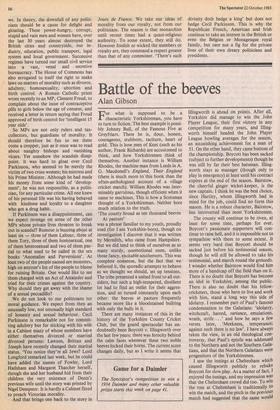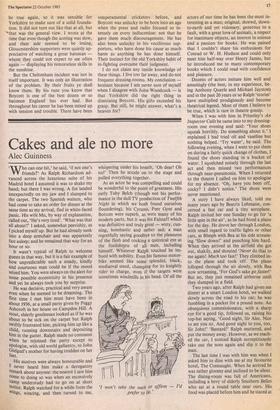Battle of the beeves
Alan Gibson
or what is supposed to be a characteristic Yorkshireman, you have to turn to fiction. The best example is possi- bly Johnny Bull, of the Famous Five at Greyfriars. There he is, dour, honest, courageous, stubborn, taciturn, heart of gold. This is how men of Kent (such as his author, Frank Richards) are accustomed to think, and how Yorkshiremen think of themselves. Another instance is William Rhodes, the machine man from Leeds in A.
G. Macdonell's England, Their England (there is much more to this book than the
often-anthologised account of a village cricket match). William Rhodes was inter- minably garrulous, though efficient when it came to machines. This is how a Scotsman thought of a Yorkshireman. Neither bore much relation to the truth.
'The county broad as ten thousand beeves At pasture' was a phrase familiar to my youth, proudly used (for I am Yorkshire-born), though on investigation I discover that it was written by Meredith, who came from Hampshire. But we did tend to think of ourselves as so many sturdy, unemotional oxen, unlike those fancy, excitable southerners. This was complete nonsense, but the fact that we believed it, the sporadic attempts to behave as we thought we should, set up tensions. The tribe presented a united front to all out- siders, but such a high-tempered, dissilient lot had to find an outlet for their aggres- sion, and so turned constantly upon each other: the beeves at pasture frequently became more like a bloodstained bullring with only the bulls in it.
There are many instances of this in the history of the Yorkshire County Cricket Club, but the grand spectacular has un- doubtedly been Boycott v. Illingworth over the last few years: there was ferocity behind the calm faces whenever these two noble beeves locked their horns. The current score changes daily, but as I write it seems that Illingworth is ahead on points. After all, Yorkshire did manage to win the John Player League, their first victory in any competition for many years, and Illing- worth himself headed the John Player League bowling averages for the season, an astonishing achievement for a man of 51. On the other hand, they came bottom of the championship. Boycott has been sacked (subject to further developments) though he was still by far their best batsman. Illing- worth stays as manager (though only to play in emergency) at least until his contract expires at the end of the season. Bairstow, the cheerful ginger wicket-keeper, is the new captain. I think he was the best choice, since Hartley, whom Illingworth had in mind for the job, could find no form this season. He is a robust character, Bairstow, less introverted than most Yorkshiremen.
The county will continue to be riven, at least for some time, perhaps for ever. Boycott's passionate supporters will con- tinue to raise hell, and it is impossible not to sympathise with them to some extent. It seems very hard that Boycott should be sacked just before his testimonial season, though he will still be allowed to take his testimonial, and march round the grounds. I wonder whether Bairstow would find him more of a handicap off the field than on it. There is no doubt that Boycott has become an idol in Yorkshire, among the public. There is also no doubt that his fellow- cricketers, those who have to live and work with him, stand a long way this side of idolatry. I remember part of Paul's famous condemnation to the Galatians: 'idolatry, witchcraft, hatred, variance, emulations, wrath, strife ... ' and how he says a few verses later, 'Meekness, temperance; against such there is no law'. I have always taken the view, in an old theological con- troversy, that Paul's epistle was addressed to the Northern and not the Southern Gala- tians, and that the Northern Galatians were progenitors of the Yorkshiremen.
I saw the innings at Cheltenham which caused Illingworth publicly to rebuke Boycott for slow play. As a matter of fact, I enjoyed the innings, and my impression was that the Cheltenham crowd did too. To win the toss at Cheltenham is traditionally to win the match, and the pitch in the previous match had suggested that the same would be true again, so it was sensible for Yorkshire to make sure of a solid founda- tion. It did not turn out like that at all, but that was the general view. I wrote at the time that even though the scoring was slow, and their side seemed to be losing, Gloucestershire supporters were quietly ap- preciative of watching a great batsman — whom they could not expect to see often again — displaying his remorseless skills in the sunshine.
But the Cheltenham incident was not in itself important. It was only an illustration of the problem. By their fruits ye shall know them. By his runs you know that Boycott is one of the best dozen or so batsmen England has ever had. But throughout his career he has been mixed up with tension and trouble. There have been temperamental cricketers before, and Boycott was unlucky to be born into an age when the press and radio focused so in- tensely on every indiscretion: not that he gave them much discouragement. He has also been unlucky in his vociferous sup- porters, who have done his cause as much harm as anything he has done himself. Their instinct for the old Yorkshire habit of in-fighting overcame their judgment.
1 do not claim any inside knowledge of these things. I live too far away, and do not frequent dressing-rooms. My conclusion — hesitant because I am never sure of myself when I disagree with John Woodcock — is that Yorkshire did the right thing in dismissing Boycott. His gifts exceeded his grasp. But still, he might answer, what's a heaven for?















































 Previous page
Previous page